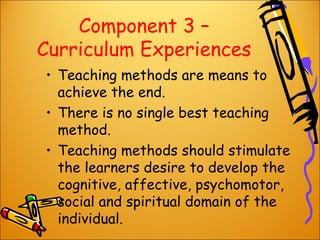Report
Share

Recommended
Recommended
More Related Content
What's hot
What's hot (20)
SCIENTIFIC MODELS OF CURRICULUM DEVELOPMENT RALPH TYLER AND HILDA TABA

SCIENTIFIC MODELS OF CURRICULUM DEVELOPMENT RALPH TYLER AND HILDA TABA
Models of curriculum evaluation and application in educational

Models of curriculum evaluation and application in educational
Similar to Curr.devt
Similar to Curr.devt (20)
IMPLEMENTING THE CURRICULUM (curriculum development)

IMPLEMENTING THE CURRICULUM (curriculum development)
The Instructional leader: TOwards School Improvement

The Instructional leader: TOwards School Improvement
More from Maria Angela Leabres-Diopol
More from Maria Angela Leabres-Diopol (20)
Representation and organization of knowledge in memory

Representation and organization of knowledge in memory
Recently uploaded
https://app.box.com/s/7hlvjxjalkrik7fb082xx3jk7xd7liz3TỔNG ÔN TẬP THI VÀO LỚP 10 MÔN TIẾNG ANH NĂM HỌC 2023 - 2024 CÓ ĐÁP ÁN (NGỮ Â...

TỔNG ÔN TẬP THI VÀO LỚP 10 MÔN TIẾNG ANH NĂM HỌC 2023 - 2024 CÓ ĐÁP ÁN (NGỮ Â...Nguyen Thanh Tu Collection
Mehran University Newsletter is a Quarterly Publication from Public Relations OfficeMehran University Newsletter Vol-X, Issue-I, 2024

Mehran University Newsletter Vol-X, Issue-I, 2024Mehran University of Engineering & Technology, Jamshoro
https://app.box.com/s/x7vf0j7xaxl2hlczxm3ny497y4yto33i80 ĐỀ THI THỬ TUYỂN SINH TIẾNG ANH VÀO 10 SỞ GD – ĐT THÀNH PHỐ HỒ CHÍ MINH NĂ...

80 ĐỀ THI THỬ TUYỂN SINH TIẾNG ANH VÀO 10 SỞ GD – ĐT THÀNH PHỐ HỒ CHÍ MINH NĂ...Nguyen Thanh Tu Collection
Recently uploaded (20)
UGC NET Paper 1 Mathematical Reasoning & Aptitude.pdf

UGC NET Paper 1 Mathematical Reasoning & Aptitude.pdf
HMCS Max Bernays Pre-Deployment Brief (May 2024).pptx

HMCS Max Bernays Pre-Deployment Brief (May 2024).pptx
Sensory_Experience_and_Emotional_Resonance_in_Gabriel_Okaras_The_Piano_and_Th...

Sensory_Experience_and_Emotional_Resonance_in_Gabriel_Okaras_The_Piano_and_Th...
TỔNG ÔN TẬP THI VÀO LỚP 10 MÔN TIẾNG ANH NĂM HỌC 2023 - 2024 CÓ ĐÁP ÁN (NGỮ Â...

TỔNG ÔN TẬP THI VÀO LỚP 10 MÔN TIẾNG ANH NĂM HỌC 2023 - 2024 CÓ ĐÁP ÁN (NGỮ Â...
Beyond_Borders_Understanding_Anime_and_Manga_Fandom_A_Comprehensive_Audience_...

Beyond_Borders_Understanding_Anime_and_Manga_Fandom_A_Comprehensive_Audience_...
Exploring_the_Narrative_Style_of_Amitav_Ghoshs_Gun_Island.pptx

Exploring_the_Narrative_Style_of_Amitav_Ghoshs_Gun_Island.pptx
ICT Role in 21st Century Education & its Challenges.pptx

ICT Role in 21st Century Education & its Challenges.pptx
80 ĐỀ THI THỬ TUYỂN SINH TIẾNG ANH VÀO 10 SỞ GD – ĐT THÀNH PHỐ HỒ CHÍ MINH NĂ...

80 ĐỀ THI THỬ TUYỂN SINH TIẾNG ANH VÀO 10 SỞ GD – ĐT THÀNH PHỐ HỒ CHÍ MINH NĂ...
Plant propagation: Sexual and Asexual propapagation.pptx

Plant propagation: Sexual and Asexual propapagation.pptx
Interdisciplinary_Insights_Data_Collection_Methods.pptx

Interdisciplinary_Insights_Data_Collection_Methods.pptx
Curr.devt
- 1. Component 3 – Curriculum Experiences • Teaching methods are means to achieve the end. • There is no single best teaching method. • Teaching methods should stimulate the learners desire to develop the cognitive, affective, psychomotor, social and spiritual domain of the individual.
- 2. Component 3 – Curriculum Experiences • Learning styles of the students should be considered. • Every method should lead to the development of the learning outcomes. • Flexibility should be a consideration in the use of the teaching methods.
- 3. Component 4 – Curriculum Evaluation • Worthen and Sanders (1987) - all curricula to be effective must have the element of evaluation. - Curriculum evaluation refer to the formal determination of the quality, effectiveness or value of the program, process, product of the curriculum.
- 4. Component 4 – Curriculum Evaluation • Tuckman (1985) - defines evaluation as meeting the goals and matching them with the intended outcomes.
- 5. Stufflebeam’s CIPP (Content,Input,Product,Process) Model • Context refers to the environment of the curriculum. • Input refers to the ingredients of the curriculum. • Process refers to the ways and means of how the curriculum has been implemented. • Product indicates if the curriculum accomplishes its goals.
- 7. Steps in Curriculum the Evaluation 1. Focus on one particular component of the curriculum. 2. Collect or gather the information. 3. Organize the information. 4. Analyze information. 5. Report the information. 6. Recycle the information for continuous feedback, modification and adjustments to be made.
- 8. Interrelationship of the Components of a Curriculum
- 10. Behavioral Approach • Based on a blueprint • The learning outcomes are evaluated in terms of goals and objectives set at the beginning. • Aimed to achieve efficiency. • The change in behavior indicates the measure of the accomplishments.
- 11. Managerial Approach • School administrators are less concerned about the content than about organization and implementation. • Curriculum managers look at curriculum changes and innovations as they administer the resources and restructure the schools.
- 12. Roles of the Curriculum Supervisors (Ornstein and Hunkins, 2004) • Help develop the school's education goals. • Plan curriculum with students, parents, teachers, and other stakeholders, • Design programs of study by grade levels. • Plan or schedule classes or school calendar.
- 13. • Prepare curriculum grades or teacher guides by grade level or subject area. • Help in the evaluation and selection of textbooks. • Observe teachers • Assist teachers in the implementation of the curriculum • Encourage curriculum innovation and change. • Develop standards for curriculum and instructional evaluation.
- 14. Systems Approach • The parts of the total school district or school are examined in terms of how they relate to each other. • To George Beauchamp, the systems theory of education see the following to be of equal importance are (1) administration (2) counseling (3) curriculum (4) instruction and (5) evaluation.
- 16. Humanistic Approach • Considers the formal or planned curriculum and the informal or hidden curriculum. • The learner is at the center of the curriculum.
